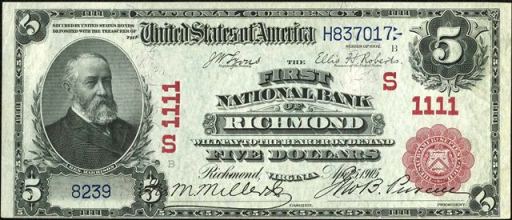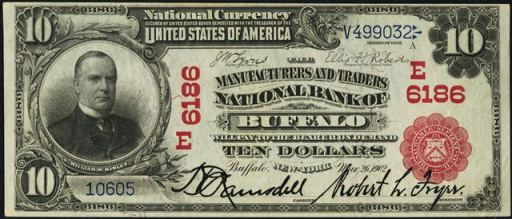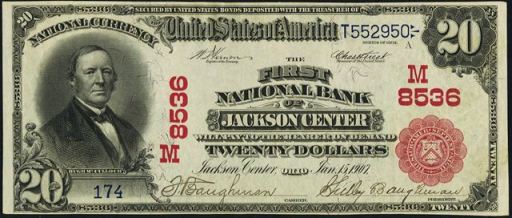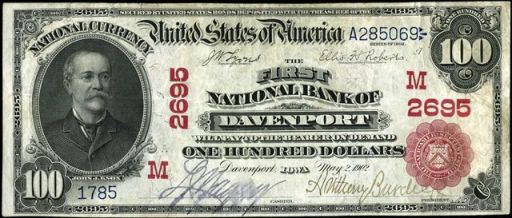The National Suffolk Bank Of Boston
The National Suffolk Bank Of Boston in Massachusetts printed $271,450 dollars worth of national currency. That is a pretty standard output. However, some types of currency from this bank could still be rare. This national bank opened in 1902 and stopped printing money in 1903, which equals a 2 year printing period. That means that money from this bank was not entering circulation very often. During its life, The National Suffolk Bank Of Boston issued 5 different types and denominations of national currency. We have examples of the types listed below. Your bank note should look similar. Just the bank name will be different. For the record, The National Suffolk Bank Of Boston was located in Suffolk County. It was assigned charter number 6104.
We buy all national currency. Please call or email us for a quote. Sales@AntiqueMoney.com
The National Suffolk Bank Of Boston in Massachusetts issued 3,725 sheets of $5 1902 red seal national bank notes. That may sound like a high number. However, red seals did not survive in large numbers. It is likely still quite rare. Five dollar red seals are typically a little bit rarer than some higher denominations. That rarity is typically just a result of small issuances. Most national banks preferred to issue $10 and $20 1902 red seals. Each one of these five dollar bank notes has a portrait of Ben Harrison on the left hand side of the bill. Most people are quick to notice the cursive charter date with a year between 1902 and 1908 written on it. That date will never affect the value.
1902 $5 Red Seal National Bank Note
The National Suffolk Bank Of Boston printed 2,970 sheets of $10 1902 red seal national bank notes. That may sound like a high number. However, red seals did not survive in large numbers. It is likely still quite rare. Collectors love ten dollar 1902 red seals. They usually represent the rarest bank notes printed by any national bank. Don’t let the term “series of 1902” confuse you. These were actually printed for about six years between 1902 and 1908. That is obviously a very short issue period which means that many red seals are quite rare. Each note has a portrait of William McKinley. Be sure to check the number under McKinley. If it is #1 then you are dealing with a note from the first sheet of bank notes issued. Number one bank notes are worth even more money than the already rare red seals.
1902 $10 Red Seal National Bank Note
The National Suffolk Bank Of Boston also printed 2,970 sheets of $20 1902 red seal national bank notes. Twenty dollar red seal bank notes have poor survival rates. They don’t command premiums compared to the ten dollar denomination, but they are definitely rarer. All 1902 red seals were printed on four note sheets. There were three ten dollar bills and one twenty dollar bill per sheet. The 1902 $20 notes have a portrait of Hugh McCulloch on them. The charter number and seal are both printed in red ink. The serial numbers have a slight blue tint to them. The charter number is printed around the border of the note several times. The bank’s title is right in the middle of the note and the state of issue is printed just below the title. Remember that all national bank notes are valued based on their condition and rarity. The same rule applies to 1902 $20 red seals.
1902 $20 Red Seal National Bank Note
The National Suffolk Bank Of Boston also printed 323 sheets of $50 1902 red seal national bank notes. That is also the exact number of $50 red seals printed by this bank. Each sheet contained one $50 bill and one $100 bill. They are all extremely rare. The value for a generic circulated example is usually around $4,000. Most are worth more and some can be worth considerably more. John Sherman is pictured on each note. Otherwise it has the same markings you would expect to find on any 1902 red seal.
1902 $50 Red Seal National Bank Note
The National Suffolk Bank Of Boston also printed 323 sheets of $100 1902 red seal national bank notes. As we said above, all high denomination 1902 red seals are extremely rare. The number of notes printed really doesn’t matter to collectors. 1902 $100 red seals are rare to the point that they are always in demand. Of course the standard valuation rules still apply. Condition and bank of issue are of paramount importance. We have paid over $12,000 for some of the rarest specimens.
1902 $100 Red Seal National Bank Note



